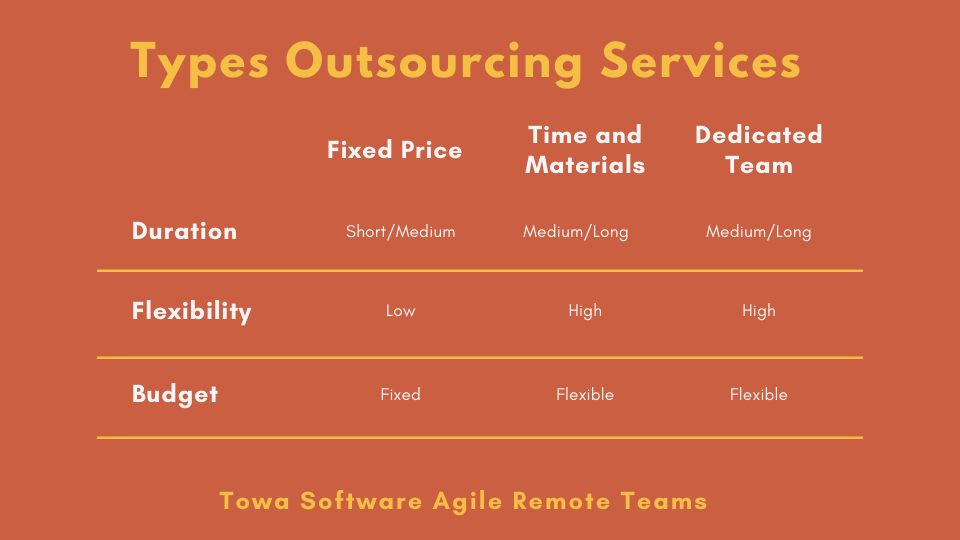Payment Time
As we mentioned before, the most common forms of payment agreement are:
- Fixed-price means the price is paid for an entire project. It can be helpful for you to know upfront what the project will cost. This type is less flexible for changes but gives more certainty on how long it will take to develop.
- In Time and Materials, you have to pay for the time spent and the cost of materials. Time and materials contract is easier to kick off. Because it requires less preparation and planning. Besides, the development team has more flexibility to maintain the high quality of the project.
Your contract should detail a schedule of payments including:
- The date that each payment must be made.
- How payments will be made.
- Additional fees that may be incurred.
Planning payments ahead of time is always a better practice, know your cash flows and payment due dates in advance.
Cost Estimate
Cost savings is arguably the major reason to outsource services and staffing. However, one of the common contract loopholes in IT outsourcing is also about the cost.
It’s easy to fall into the temptation of selecting the least expensive providers to save money. Unfortunately, sometimes the lowest bid comes with poor quality.
Nobody wants to provide a negative experience for a customer. So you and your software outsourcing provider should be made clear what are the communication channels, deadlines for payments, and if there is flexibility.
To avoid mistakes in your contract, you have to set all the rules for payment and service.
User Acceptance Testing
In general, acceptance testing is done at the end of each development phase or Sprint. If your provider has a specific QA process that should form part of the testing, it should be documented. The agreement should also note the time assigned for testing, fixing bugs, and warranty time after launch for proving support for any defects or incidents.
For Testing, you should note the following
- Who does the testing?
- How long does it take?
- What is the warranty for bug fixing?
Measure KPIs
Your outsourcing contract should specify the key performance indicators of the project. When the contract clauses are misaligned with the business objectives, problems arise
You should consider SLA, service hours, and service elements, human resources as well as technical resources required. This allows you to prevent contract clauses and have a flexible approach to describing the service.
Duration of Contract
When you signed an outsourcing contract, it means the provider is the right one at that moment. However, things can change with time and business strategy. Maybe, you wish to transfer an outsourced service to another vendor or bring it back in-house development. Contract loopholes relating to exit management should be clear, but they are often ignored.
Therefore, from the establishment of the contract, the exit option must be integrated. What are the elements that will be transferred back to the customer? What are the knowledge transfers that will be provided in case of not outsourcing anymore? When and why could you decided to end the services provided must be stated in the contract.
Security on Top
Many of the most commonly outsourced processes require the transfer of data. Therefore, it can carry significant contract loopholes with data protection.
First of all, to ensure data protection, there are questions that should be asked:
- Are the outsourcing company’s services compliant with good data protection?
- What are the security measures in place to prevent abuse of data?
Outsourcing agreements should cover key data protection issues. Then, the provider has to compliant with the legislation.
The contract needs to cover the extraction and removal of your data.
It’s also highly recommended you take advantage of how the transfer back to your systems can be made securely.
Conclusion
When starting outsourcing with a new outsourcing partner, many companies tend to sign the contract without having the resources to manage the agreement. As an Owner, CEO, CIO, or CTO you should know how to follow up on a detailed outsourcing contract. But we highly suggest that you write a simple contract through a clear and structured model of cooperation. Both client and software outsourcing providers should consider including timeline, the scope of work, payment terms, data security, clarify service description, ending clause, and notice periods.
Towa Software has over 20 years of experience to guarantee the quality of every line of code, we are proud of our products and services delivered. We recommend starting small and build trust with your provider before scaling.
We have expert Project Managers and Innovation Consultants along with top talented teams who have delivered awesome products to customers in U.S.A, Canada, Mexico, London, and Australia.
As a leading software development outsourcing company in the USA and Mexico, we have extensive experience in many fields including fintech, banking, payments gateways, e-commerce, retail, marketplaces, health care, Omnichannel, and many more.
You can contact us at support@towasoftware.com or give us a call via (+1) 210-787-4525 for more information.
You can Book a 15-min call call with one of our Customer Success Managers for a conversation.








